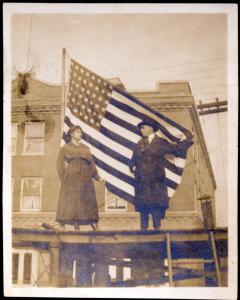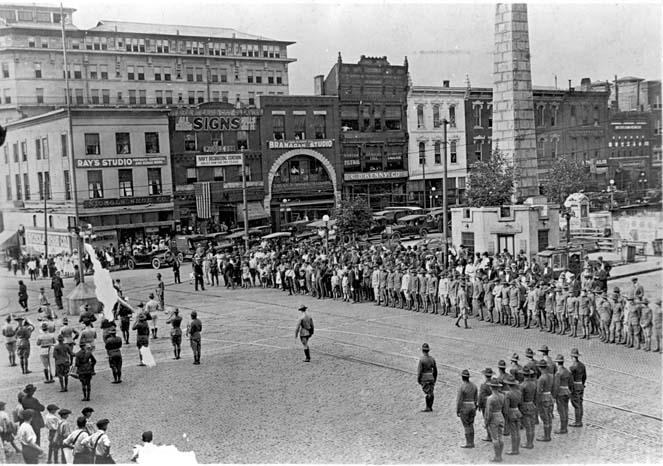In late November 1917, Asheville, along with the rest of the country, was preparing for its first Thanksgiving since entering the Great War. Food, coal and gas were in short supply because of wartime efforts. Self-sacrifice was considered a patriotic duty; consumerism was promoted along the same lines.
On Thanksgiving Day, Nov. 29, 1917, Anthony Bros, a clothing store on Patton Avenue, announced in The Asheville Citizen that it would be closed for the holiday. Praise for the country accompanied the store’s announcement. Anthony Bros declared that the U.S. “never had more to be thankful for,” highlighting the work of both the Red Cross and the armed services.
Along with its praise, Anthony Bros took it upon itself to speak on the community’s behalf, stating: “Those who bought Liberty Bonds are thankful that the opportunity has been given them to serve.” Meanwhile, men who were not in uniform could still fulfill their patriotic duty “by selling good, dependable merchandise and by giving good values; that’s what we are doing.”
Not everyone was as enthusiastic as Anthony Bros. In the same issue of The Asheville Citizen, one article bemoaned the consequences of the war on daily life:
“Those who partake of turkey today will be thankful for one more chance before Mr. Hoover [then head of the Food Administration] reproves them again. Those who didn’t can congratulate themselves on their patriotism and save the money for another Liberty bond. Those having a winter’s supply of coal in the upper shelf of the refrigerator can offer thanks, and those who haven’t can go to the municipal wood yard and be thankful that wood isn’t sold by the pound — yet.”

In some cases, stores used the scarcity of goods as a marketing tool. On Wednesday, Nov. 28, 1917, Goode’s Drug Store Inc. advertised “Special Thanksgiving Candy.” The advertisement read:
“We were fortunate in using a little foresight and buying plenty of delicious Whitman’s Candies for Thanksgiving and the holidays. The sugar shortage is serious and we advise ‘lovers of sweets’ to buy Whitman’s packages now.”
The day after Thanksgiving, The Asheville Citizen underscored the necessity and importance of wartime efforts. In the article, “FOOD SITUATION IS MORE SERIOUS THAN CONSIDERED,” the paper reported, “[t]he greatest danger that threatens the allied cause and human liberty is that there may be a collapse in France or England or Italy as a result of food shortage.”
The same article went on to note:
“Every man, woman, or child in America who saves the smallest quantity of beef or pork or mutton or sugar or fats can have the satisfaction of knowing that he is not only helping to save our friends and allies but that he is helping to save the innocent people of neutral Europe from actual starvation and death.”
In that same day’s paper, The Asheville Citizen ran the headline: “ASHEVILLE GIRLS EATING LESS CANDY.” The article reported an increase in candy sales, while noting local candy dealers believed these purchases were being sent overseas. This was important, the report continued, because “[n]ext to tobacco, the boys in the trenches crave candy, and plenty of it.”
The article went on to assert:
“[T]he boys want candy, for nearly all men have a sweet tooth … a relic from their childhood days. The definition of the word candy is to make pleasant or agreeable, and this is known to married men, as a rule. For a box of candy is often used to make the sea of matrimony more smooth and the surroundings more pleasant and agreeable, and the same rule applies to the boys in the trenches and the camps.
“So, if the girls of Asheville are eating less candy than before the war, it is simply because they have accepted still another opportunity for service and self-sacrifice, and are denying themselves sweets that the lives of their soldiers may be sweetened.”



Before you comment
The comments section is here to provide a platform for civil dialogue on the issues we face together as a local community. Xpress is committed to offering this platform for all voices, but when the tone of the discussion gets nasty or strays off topic, we believe many people choose not to participate. Xpress editors are determined to moderate comments to ensure a constructive interchange is maintained. All comments judged not to be in keeping with the spirit of civil discourse will be removed and repeat violators will be banned. See here for our terms of service. Thank you for being part of this effort to promote respectful discussion.